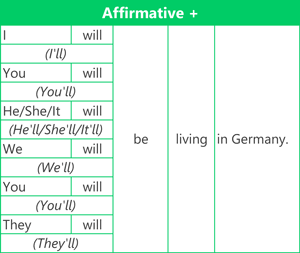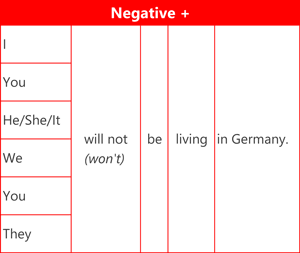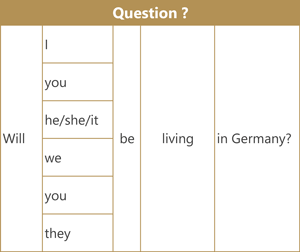What is the future continuous?
The future continuous (or future progressive) is one of the English verb tenses.
You can learn more English online by visiting our free English grammar lessons, which include other verb tenses and more grammar points.
You can also find more grammar, vocabulary and communication tasks for each English level:
Use & examples |
We use the future continuous tense to describe:

(1) Temporary actions in the future
It describes a temporary action that will take place over a period of time in the future.
- I'll be writing emails this evening.

(2) Gives background information around a specific time in the future
This can describe an action or event that will already be in progress at a particular moment in the future.
- At this time tomorrow, she'll be flying to New York.
- The children will be sleeping when I get home later.

(3) Predicting the present
The future continuous can be used to predict something that we think is happening now.
- We can't go to your brother's house now. The children will (already) be sleeping.

(4) Polite enquiries
The future continuous can be used to ask about someone's plans in a polite way.
- Will your parents be cooking dinner for us tonight?
Form |
How do you write and pronounce the future continuous?
Form: Key points
- Use will + be + main verb (-ing).
Here are examples of the affirmative (positive) form, negative form and question form using the verb 'live'.


Contractions
Contractions can also be used in the negative form between the subject pronoun and 'will'.
- I will not = I'll not
- We will not = We'll not

Short answers
- Yes, I will. / No, I won't.
- Yes, you will. / No, you won't.
Pronunciation
We commonly use contractions for the future continuous tense (e.g. 'I'll be meeting friends' or 'He won't be working'), especially when speaking English.
Notes |
For the future continuous, we have extra information about:
- spelling exceptions for verbs and
- time expressions that you can use.
Spelling exceptions for verbs
Sometimes we need to remove a letter, and other times we need to add another letter. Here are the exceptions:
1) One 'e' at the end of a verb
Remove the final 'e' and add 'ing'.
Examples:
[live] I will be living in Germany.
[save] I'll be saving money for a new car.
* Verbs ending in 'ee'
These follow the normal rules.
Examples:
[see] He'll be seeing his friends.
2) Verb ends with consonant + one stressed vowel + one consonant
Double the final consonant and add 'ing'.
Examples:
[swim] We'll be swimming in the sea.
* Verbs ending with an unstressed vowel
These follow the normal rules, and the last consonant is not doubled.
Examples:
[develop] They'll be developing new ideas at the company.
3) Verb ends in 'l' (British English)
Double the final consonant and add 'ing'.
Examples:
[travel] I'll be travelling with friends.
4) Verb ends with 'ie'
Change 'ie' to 'y' and add 'ing'.
Examples:
[tie] She'll be tying her shoelaces.
5) Verb ends with 'ic'
Add 'k' before 'ing'.
Examples:
[panic] He'll be panicking about the exam.
Time expressions used with future continuous
Here are time markers that can be used with the future continuous.
1) next week / month / year
This gives a time in the future.
Examples:
I'll be starting start at the new company next week.
2) later / this afternoon / tonight / tomorrow / soon
This gives a time in the near future.
Examples:
We'll be meeting your parents for dinner tonight.
3) in / on / at
It is also possible to use these prepositions of time for the future, but it is also common to use the present continuous for future arrangements.
Examples:
We'll be leaving in ten minutes / on Saturday / at the weekend. (Future continuous)
We're leaving in ten minutes / on Saturday / at the weekend. (Present continuous)
Quizzes |
Quiz 1: Temporary actions in the future
What will be happening at work later this morning and this afternoon?
[Topic: Work]
Type the verbs in the future continuous tense and use the affirmative, negative or question form.